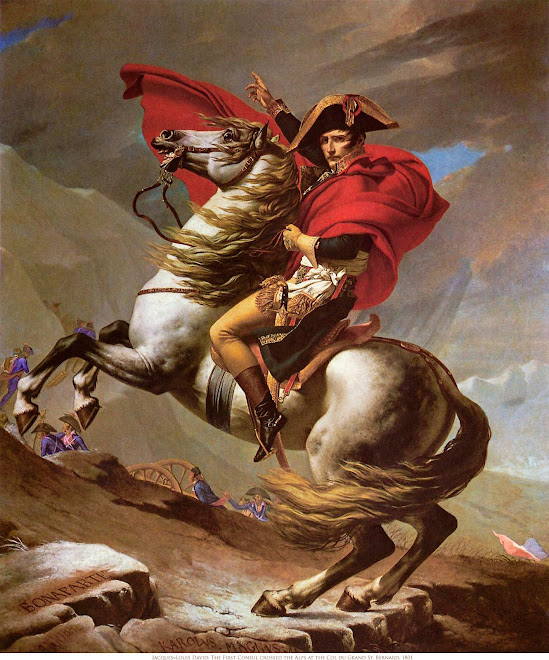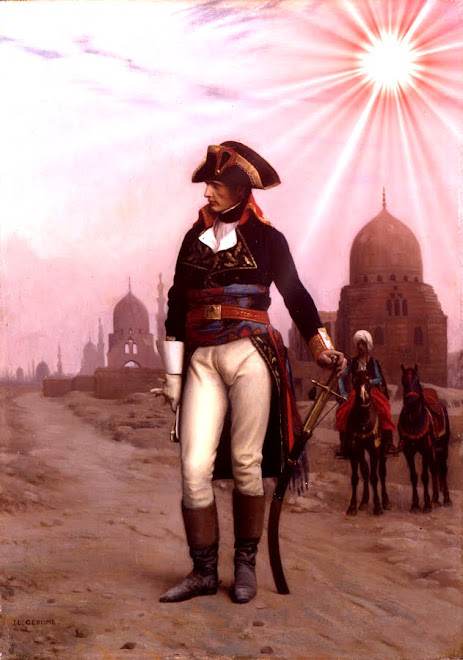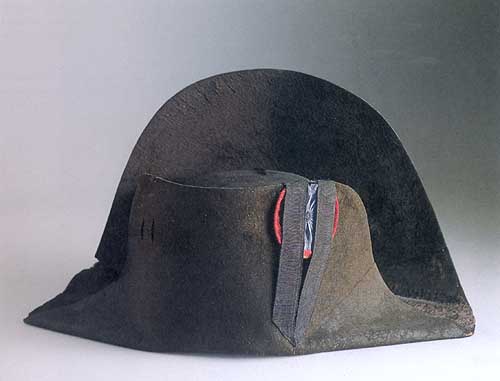Napoleon at Toulon by Detaille
There are lies, damned lies - and the BBC website. This supposed bastion of truth and knowledge makes Goebbels look like an amateur. This is its take on Napoleon. The piece is entitled Napoleon versus Europe as if to state by definition that all of Europe was against Napoleon and all of Europe disagreed with him. It then goes on:
'To understand Waterloo, it's important to know Napoleon had
been trying to establish a European empire under his military dictatorship since 1804.'
Obviously, no hint of any bias there whatsoever.
'The British defeated him at Trafalgar in 1805, but Napoleon went on to invade
countries across Europe before being forced to abdicate. He returned to Paris in
March 1815, prompting Britain, Prussia, Russia and Austria to declare war.'
So says the BBC in its sacred scrolls. Oh, so it must be true then...
Above is a picture of a young Napoleon at Toulon. The British Navy had been invited into harbour by Royalist rebels. After all, the British would not have minded if the French navy invaded Portsmouth would they? Napoleon personally placed the French guns under intense fire and braved the hazards his men faced - unlike the British politicians who repeatedly paid for Austrian and Russian soldiers to attack France. The British paid - the foreigners died. The British Navy had no right to be in French waters - but then the navy of his Britannic Majesty arrogantly believed that even a duckpond should be served by a British vessel.
It was this consummate arrogance that led the Americans to declare war in 1812. The British impressed American sailors claiming they were still really 'British' despite the American Revolution. Incidently, at the battle of New Orleans on January 8th 1815, the same year as Waterloo, his Majesty's forces were utterly destoyed by Andrew Jackson and his "dirty shirts" - 2,000 redcoats killed for only seven American dead and six wounded. Why was I never taught this in my English grammar school? I wonder if this battle is covered on the BBC website... It was a victory on a par with Waterloo which the British try to pretend never happened.
As the English historian Walter Runciman has said, when the British Government rejected Napoleon's peace feelers in early 1805 - we had no cause to insult him treat him like an imposter and an inferior which is what we did. Runciman believes that had we treated with Napoleon honestly there need never have been war between the two countries.
But it was war that the British wanted. Pitt and his ilk could never accept the French Revolution. What - equal rights for the common people? Heaven forfend! So hierarchical was British Society, they could have taught the Indian caste system a thing or two. The Royal Family were literally a breed apart - like the Bourbons they believed God had put them in their illustrious stations and sanctioned their every utterance with gospel-like authority. This First Family consisted of a stammering nutter and a sex-crazed obese drunk and opium addict who believed he had fought at Waterloo himself. Like father - like son... 'Prinny' was a sexually incontinent imbecile who thought he was the bees' knees. God help poor Britannia!
So strict were the social conventions of the day that when Nelson wanted to sport Lady Hamilton on his one good arm at posh parties, the aristocratic toffs would have none of it. This pissed Nelson off no end. Nelson callously ignored his wife just like that other 'hero' Wellington, who treated his wife abominably. His descendant Lady Jane Welesley has said he was : 'A bad husband and an inadequate father.' At their only ever meeting, Wellington was shocked to discover that Nelson thought even more of himself than the Duke did of himself! Wellington was a snob, who treated his inferiors badly and sucked up to his superiors. No wonder he called his men 'scum'. They fought heroically for him and admired him as a general, but they didn't love him as Napoleon's soldiers loved him. In Tim Clayton's book Waterloo there are many accounts of British surgeons amputating the limbs of French soldiers who subsequently died with Napoleon's name upon their lips. The word 'Emperor' was often the very last breathed by many a French soldier.
But none of this is on the BBC website...
To return to the gospel according to the BBC - and Napoleon versus Europe - the British and French had been fighting each other for decades - long before Napoleon was born. Without French help, the Americans would never had gained their independence, a temporary mastery of the sea by the French Navy being particularly helpful. The French under Louis XVI bankrupted their nation to free the Colonists from British bondage. And incidently, Napoleon's 'right arm' Berthier got experience of warfare fighting in America.
Napoleon wanted to recreate France as a great nation. His Code Napoleon; his forming of the Bank of France; his Civil Code; his Concordat with the papacy; and his reorganization of the French school sytem were laudable achievements which benefited all of France. What did the aristocratic elite in London ever do for the common British man or woman? If the common man dared to ask for more bread, or for increased wages, or if they dared to question the God-Almighty Government, they risked a hanging or being transported to Australia for life. So cruel was this British 'system' that a Unitarian minister was exiled to Australia just for proof reading a protest banner!
But that isn't on the BBC website either...
Today's Times newspaper has a leader that oozes this unctious sense of pride and self-importance. It is an Orwellian: 'British good - Napoleon bad.' And the irony is that it was the poor Englishman who was labouring under the cosh of Big Brother Aristocrats and the 'Prinny' police state.
... No, it's not even worth looking...
The blessed BBC would have us believe that Napoleon was red in tooth and claw and that he was a Corsican bandit who certainly wouldn't be allowed at those high class royal parties. They state that he had 'his military dictatorship since 1804.' What they don't say is that there were so many assassination attempts upon his life, organised by the hideous Comte D'Artois (Mon-sewer) and paid for by the British, that he felt constrianed to make himself Emperor and see to his succession for the benefit of France. As Cadoudal said, after his failed plot on Napoleon's life - they had tried to kill a First Consul and had made an Emperor instead. So merciful was Napoleon, that he even invited Cadoudal to join his army as an officer. Similarly, Napoleon allowed the exiled French nobles to return to France.
The BBC website states that: 'The British defeated him at Trafalgar.' Napoleon wasn't at the Battle of Trafalgar - does the BBC realize this was a sea battle? In fact, Napoleon had given up on his cowardly naval commander Villeneuve and ordered him to sail to Naples. Only when he heard he had been sacked by Napoleon did he take the combined fleet out to sea. And despite all the British mythology about the 'Nelson touch' - Villeneuve predicted that Nelson would try to split the French and Spanish navies in the exact way he did.
The British Navy bombarded neutral Copenhagen in 1807 and murdered 2,000 innocent Danish men, women and children. This was the first time that weapons of mass destruction - aka Congreve rockets - were used on a civilian population. I wasn't taught this at grammar school either. Neither was I taught that the British invented concentration camps during the Boer War and had a great victory starving Boer women and children to death. Even Kaiser Wilhelm complained about this despicable way of making war. But where British history is concerned so often it is a case of: Might equals Right. The British ruled the waves and waived the rules. Time after time. We have our heroes - like Churchill's favourite Alfred the Great. We don't need to look for them in the dregs of aristocratic society in London at the time of Prinny and his gang.
The British reneged on the Treaty of Amiens by refusing to leave Malta. They then confiscated all French vessels without a declaration of war. This is commonly known as 'British fair play.' They then paid Austria and Russia to attack France - their own people safe across the Channel and behind that wooden fortress the British Navy. Pitt died after he heard the news of Austerlitz - it was the best thing he ever did. He had been trying to drink himself to death for years, as well as taxing the native population to within an inch of their lives. Pitt's epitaph? Any port in a storm... and lots of it.
What a bounder that chap Napoleon was - he kept defeating those Coalitions that attacked him! He was, in fact, far too trusting - whether it concerned his notorious brothers and sisters - or his dubious friends and allies like the starry-eyed mystic patricidal incestous Tsar Alexander of Russia. 'If I was a woman, I'd be his mistress,' Napoleon joked, taken in by the naive Russian blond bombshell. In the end (where else...) he was well and truly screwed by Alexander. Russia was a primitive country reliant on Gogol's Dead Souls - the poor peasants. Peasant soldiers never expected to see their families again. Prussia also had serfs. That wicked Napoleon abolished serfdom in all the territories he controlled. Wasn't that just too much!
Ah the BBC... Like all licence payers, I have to pay £145-50 a year to receive their pearls of wisdom. Why do they have to lie and deceive and misinform - with my money?!
Napoleon was the greatest man of the C19th as Goethe said. He deserves to be Heine's hero. He was Hazlitt's hero too - and Byron's. He touched the hearts and souls of millions and benefitted common humanity with his enlightened rule and policies. After Waterloo came the Reaction when the Undead Aristocrats from all across Europe rose again like an army of rapacious zombies - feeding off the corpses of the common man. Come back Napoleon - all is forgiven!
C. JohnTarttelin 2015
A Souladream Production






